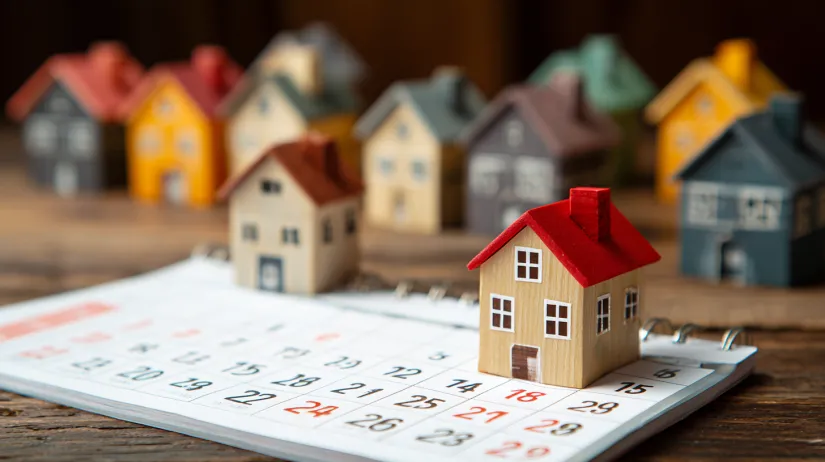Table of Contents
Quality Service Guarantee Or Painting Free

Get a rental agreement with doorstep delivery

Find the BEST deals and get unbelievable DISCOUNTS directly from builders!

5-Star rated painters, premium paints and services at the BEST PRICES!
Loved what you read? Share it with others!

Residential vs Commercial Property: Meaning, Benefits, Types and Rates in 2026
Table of Contents
Real estate is something that is permanently attached to the land. This includes man-made additions on the land like buildings, houses, apartments, shops, etc. There are three terms in real estate which are often confused and interchanged:
- Real property: This property refers to the inherent ownership to use the land and benefits and have rights.
- Land: Anything which is below the centre of the earth to the airspace above, including trees, buildings, etc.
- Real estate: This includes land and any additions made by humans like building, houses, apartments, shops, etc.
Real estate can be broadly classified into five broad types. They are residential real estate, commercial real estate, industrial real estate, land, and special houses. In this article, you will get detailed knowledge of residential property and commercial property, their characteristics, and the differences between residential and commercial property.
What is a Residential Property?
Residential property is a place where houses are built for the purpose of staying in or residing. These houses are completely for self-use and cannot be used for industrial or commercial purposes. A residential house can be broadly classified into the following types:
Quality Service Guarantee Or Painting Free

Get a rental agreement with doorstep delivery

Find the BEST deals and get unbelievable DISCOUNTS directly from builders!

5-Star rated painters, premium paints and services at the BEST PRICES!
Different Types of Residential Properties
- Stand-alone house: As the name suggests, this is a type of house that is a free-standing residential building. This is also known as a detached house, detached residence, single-family home, and single-detached dwelling.
- Multi-family residential: This is also known as a multi-dwelling unit or MDU. Here, there will be multiple separate houses for residential purposes inside one building. This can be built either one next to another one or one on top of the other. Common examples include apartments, mixed-use buildings, row houses or brownstone, bedsit, cluster houses, condominiums, deck access, flats, four-plus ones, garage-apartment, Garlow, warehouse version, Maisonette, penthouse, plattenbau, terraced house, triple-decker, etc.
- Mobile home: This type of house can be moved from one place to another. Most common examples include park homes, trailer homes, caravans, RVs, motorhomes, etc.
- Duplexes: These are the housing type where one house has two distinct dwelling units with two separate entrances, but a single structure.
Calculating Rent on Residential Properties
When comparing residential and commercial real estate, it's important to keep in mind that the gross rental yields on residential properties typically range from three to five percent annually on the fair market value of the property. Let's examine the distinction between business and residential property taxes. The net yields typically fall between two and three per cent annually after deducting insurance, property taxes, and maintenance. Rental price increases range from five to seven percent annually. On the other hand, gross yields in commercial real estate typically range from six to ten percent annually. The annual net yields typically range from 5% to 8% after deducting insurance, property taxes, and maintenance. Rent increases here range from three to five percent annually. According to Amit Goenka, MD and CEO of Nisus Finance, the estimated total returns over ten years are currently between eight and nine percent per year in the residential real estate sector, as opposed to 13 to 15 percent per year in the commercial real estate sector.
Things to Consider before Buying Residential Property
- The home must be properly ventilated
- Space must be well utilized
- The material used for construction is of superior quality
- The height of the ceiling should be at least 10-12 feet
- There should be enough space for all the compartments of the house
- Quality fittings
Benefits of Residential Property
- Comparatively lesser cost: residential properties cost lesser than commercial properties. If you are a beginner and want to invest money in real estate, investing in residential property is a great option.
- Fewer complications: residential properties do not have many regulations as in the case of commercial properties. It’s easy to own and use.
- Easy to find tenants: If you are holding a residential property, finding a tenant is easier since you can decide whether the tenants can stay for the long term or short term.
- Small scale operation: Residential homes operate on a small scale compared to commercial properties. Hence, fewer complications.
Benefits of Investing in Residential Homes:
- Low Entry Cost - When compared to commercial properties, residential real estate has a lower entry cost and fewer difficulties. This is a good alternative for a newbie who wants to learn about real estate investing. Once you have some money from residential properties, you can go on to commercial enterprises.
- Reduced Tenant Turnover — When it comes to residential buildings, tenants prefer long-term leases. Businesses frequently expand or relocate, making it difficult to keep up with them, and so commercial renters are always volatile. This means that additional work must be done on a regular basis to identify suitable tenants. On the other hand, if you locate a long-term tenant, you can sue them to ensure that they treat the property as their own.
- Laws That Are Useful – Residential property rules are not only more forgiving but also less complicated than commercial property laws. Residential rules are less complicated and only apply on a small basis.
What is a Commercial Property?
Commercial properties are used for non-residential purposes like hotels, businesses, offices, retail, public facilities, industries, etc. This property will be used to run businesses. The owner can use the property by himself for business or rent it out partially or fully to the tenants.
Types of Commercial Properties
- Office buildings: This includes small professional office buildings, single-tenant buildings, downtown skyscrapers, etc.
- Retail buildings: This includes small shopping centres, grocery stores, power centres, restaurants, etc.
- Multi-family buildings: This includes high-rise apartment buildings or complexes.
- Land: This includes raw, undeveloped, or underdeveloped land which will be commercialized in the near future.
- Miscellaneous: This includes all other commercial buildings including hospitality, self-storage developments, medical, and many more.
Things to Consider Before Buying Commercial Property
- Availability of different modes of transport
- Connectivity to major commercial hubs
- Growth potential of the property
- Industries around the property location
- Infrastructure facilities available
Benefits of a Commercial Property
- Return on Investment: The return on investment is higher compared to residential properties since commercial properties will usually be located in prime locations.
- Lower maintenance cost: The amenities provided are less compared to residential properties, hence the maintenance cost is less.
- Qualified tenants: The tenants of the commercial property tend to respect the buildings since they are backed up by larger companies.
- Triple-net lease: This is a form of lease agreement where the tenant is responsible for any ongoing expenses of the building like maintenance costs, taxes, insurance, etc. Many companies like McDonald’s, Starbucks, etc., get into this agreement to maintain their brand image.
Calculating Rent on Commercial Properties
According to experts, any investment in commercial property that generates rental income, such as office, retail, warehouse, etc., necessitates that the prospective buyer take into account factors like the current leasing environment, the existing ecosystem in the region, distance from complementary and auxiliary industries, legal due diligence, clearances that are specific to the property's usage, etc.
Considering social infrastructure, the neighbourhood, and the demographics of other residents, a residential property's liveability must be evaluated as compared to commercial property.
Benefits of Investing in Commercial Properties
- Higher ROI: With higher risk comes higher ROI. When compared to the returns on residential investments, commercial real estate has the potential to provide a better ROI. Especially if the property is in a desirable area. Businesses are constantly on the lookout for a premium site and are willing to pay any price to secure it. Furthermore, the amenities given by a commercial complex are far less than those required by a residential complex, resulting in lower maintenance costs.
- Qualified Tenants: It can be difficult for residential property owners to find tenants who would look at the property as their own. With commercial real estate, the tenants are business owners and since they are backed by larger companies and should provide great customer service, they tend to respect the property. This can make your life easier.
- A triple net lease is a type of real estate leasing agreement in which the tenant is liable for the property's continuing expenses, such as taxes, maintenance costs, and insurance, in addition to rent and utilities.
Rates of Commercial and Residential Electricity
Even if residential and commercial real estate utilizes the same quality of energy from the same source, the electricity tariffs for each property are different. Although corporations and organisations use a lot of electricity and always buy in bulk, they get some tax breaks on their bills. This allows enterprises to purchase electricity at a lower cost.
Differences Between Residential and Commercial Property
- Loans: The loan for a residential property will be provided for the individual owner of the property, whereas for the commercial property, the loan will be provided for the business entity. The procedures and paperwork for a commercial property loan are lengthy and require many documents like who is going to pay the loan, additional maintenance cost, tenure, etc. Also, the terms and conditions are involved heavy restrictions and penalties.
- Electricity rates: Although both properties use electricity from the same source, the rates differ for both residential and commercial properties. Some businesses purchase electricity in bulk for their operations and get some tax benefits on their bill.
- Difficulties in purchasing: Residential properties are easier to buy than commercial properties. The commercial property owner has to undergo a significant amount of investigation before making an investment.
- Returns profile: The return of investment is usually higher with commercial properties compared to residential properties. Commercial properties are usually leased out for more than 10 years, where the owner gets the bulk money. The ROI for residential property is around 4-10% and for commercial property, it is around 6-12%.
- Risk profile: Commercial properties are leased out for a longer period of time and give the owner a stable income. But, in residential properties, the rent period is very short. Also, the notice period is very short, hence the tenor may leave soon. But that is not the case with commercial properties since they have a longer notice period.
- Maintenance: The maintenance cost for residential property is very less. The tenants use the building 24/7 and the problems that may arise because the usage is very minimal and the repair cost is less. However, the maintenance of commercial properties is expensive because of the larger machines and equipment. Sometimes, an on-site manager is required to manage the property and its maintenance.
- Contracts: for both types of properties, you have to sign either rent or lease contracts to use the property. But in residential properties, the rental contracts are signed for the short term and are less complicated. Commercial properties, on the other hand, are in-depth and complex renting contracts based on accounting standard 19 and will be signed for a long term.
- Location: The location of the property matters the most for a commercial building since many factors like transportation, water, amenities, etc. affect the running of the business. Residential property need not be in a prime location as it is only for residing.
- Law: The residential legislation supports tenants over the owners. Hence, it can be difficult to evict the tenants. On the other hand, commercial property’s lease or rent is agreed upon by both parties with contract law.
Risks and Rewards Involving Residential and Commercial Properties
Tax advantages: Rental revenue from commercial and residential buildings is subject to taxation. However, under Sections 24 and 80C of the Income-Tax Act, real estate acquired with a home loan is eligible for tax advantages.
Volatility: Because residential properties experience frequent tenant turnover, higher maintenance and upkeep expenses, and lower returns, risk and volatility are seen as being higher in residential properties. Commercial real estate or auxiliary industry properties provide reliable, long-term renters with steady income streams.
Both investing in and withdrawing from a position involve illiquid assets. However, with Real Estate Investment Trust (REIT) restrictions, building a portfolio of commercial buildings would be simpler than one of a residential one. Additionally, because there is a far higher demand than supply for Grade A pre-leased assets, they are more liquid than residential properties.
Prior to making a final decision to invest in a residential or commercial property, it is crucial to evaluate the location, investment amount, and tenure in addition to all of the above factors.
This article provides a detailed insight into both residential and commercial properties. If you are a beginner in investing, the best option for investing in a residential property. Purchase some residential properties, gain some experience in real estate and then you could think of buying a commercial property because of the risk involved in these properties. If you’re looking to rent or buy properties, be it residential houses or commercial spaces, you can start your search on NoBroker.
There are thousands of options at varying price points, and all of the properties here are with ZERO brokerage. Click the link below to start your search, or drop us a comment if you need any assistance.

Frequently Asked Questions?
Ans. Any property purchased for the purpose of residing falls under the category of residential property.
Ans. Any property purchased and used for business or any commercial purposes falls under the category of commercial property.
Ans. Residential property is better to invest if the investment is lesser and if you do not have experience.
Ans. Yes, the commercial property is costlier than a residential property because the business tends to operate in prime locations.
Ans. ROI for residential property is around 4-10% and for a commercial property, it is around 6-12%.
Recommended Reading

Plinth Area: Meaning, Calculation & Difference from Built-Up, Carpet, Covered and Floor Area
January 31, 2025
98262+ views

Builder Floors: A Budget-Friendly Path to Your Dream Home in 2026
January 31, 2025
57142+ views

Need to Know What Carpet Area Calculation is? Read on to Know All about it
January 31, 2025
55508+ views

What is Penthouse in India: Meaning, Features, Types and Benefits
January 31, 2025
37299+ views

Khata Certificate in Bangalore: The Essential Document for Real Estate Transactions
January 31, 2025
35658+ views
Loved what you read? Share it with others!
Most Viewed Articles

GFRG Panels: A New Technology in Building Construction
January 31, 2025
261920+ views

Top Cleanest Cities in India: Swachh Survekshan Top Ranked List
July 25, 2025
221322+ views

Auspicious Dates and Good Nakshatras for Land and Property Registration in 2026
May 21, 2025
200695+ views

How Mivan Construction Technology Is Transforming the Art of Building!
January 31, 2025
178874+ views

CIDCO Lottery 2025: Apply for Affordable Homes in Navi Mumbai
April 30, 2025
135972+ views
Recent blogs in
Indira Awas Yojana 2026: Meaning, Application, Documentation and Benefits in India
January 19, 2026 by Kruthi
Unique Homes Around the World: 5 Extraordinary Houses You Must See in 2026
January 19, 2026 by NoBroker.com
Top Residential Projects In Bangalore: Luxury , Affordable & Upcoming Launches in 2026
January 17, 2026 by Kruthi









 Full RM + FRM support
Full RM + FRM support

Join the conversation!